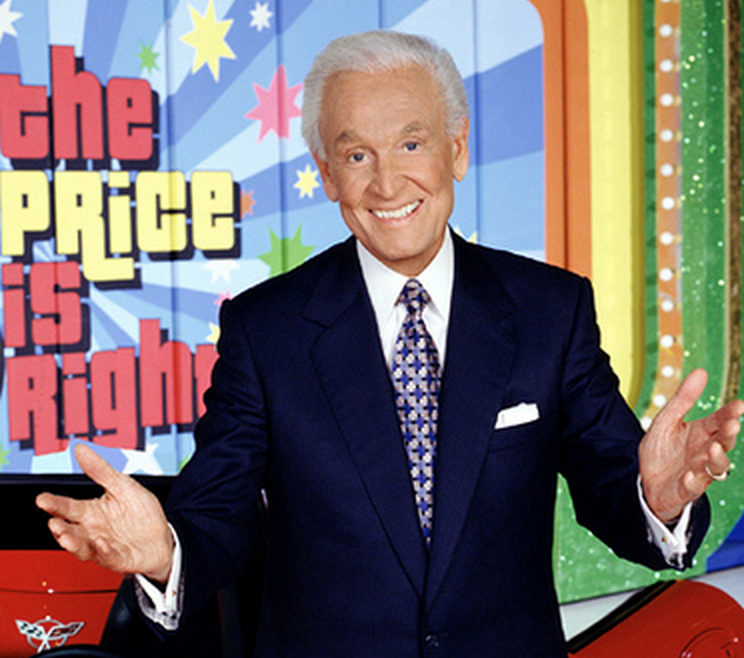
Credit: Flickr
I’m a feminist; I know witchcraft. I meet or exceed the requirements set forth by She Who Smiles Beneath The Sea, Drinking The Tears Of All Men™.
To commune with the great cosmic sage Bob Barker in the ether, you will need: nylon rope, a bass drum, a chair, and a sturdy beam high off the ground, higher than you could jump to.
If done right, you will meet him in that infinite inbetween—his perfect perma spray tanned kisser filling your mind's eye with baritone promises of endless turtle wax.
This is a very powerful spell; Bob Barker isn’t even dead yet. He will speak—it is not for you to know what he’s saying, but for you to listen. It will become clear in time, once you've awaken back in the "real world."
You must then, when you start to feel that tension pulling you away, to concentrate on your lovers and your friends and the joys of frozen pizza and a fearless hunger for oxygen—you must then break through your restraints and tear the rope off around your neck.
If you don’t, you’re just trapped on the other side. And it’s not really a spell at that point. You’re just dead.
I may have lied about this being a spell in the first place. I don't know why Bob Barker, either—I'm not a particular fan of the Price is Right, though the time he went on WWE Raw and threatened to spank another grown man rules everything around me.
When you're on the cusp of non-existence, grasping those straws with a kung fu grip is what just might save you. Relationships, financial security, your standing in the community—the "big things" in life ebb and flow, often irrespective of your intentions. But that first bite of a warm, fluffy waffle after you've been resuscitated has a value that capitalism and patriarchy can never diminish.
I know what I did was neither poetic or magical—I just wanted to dip my toe in the fantasy that 19 failed suicide attempts over a span of 23 years somehow made me powerful, or at the very least hard to kill.
Suicide is a calculated escape from desperation—it is also a paralytic of the patriarchy, used to thin the herd of potential disruptors.
Proneness to alcoholism is not a defining mark or requisite of being gay, nor an affinity for barbiturate dosage rates to being trans—these habits and vices have been invasively incorporated into our molding through a society that will not let us rent an apartment or get a job or just walk down the street in peace without the threat of society reasserting itself in the most obtrusive fashion.
Murdering a dissident provides ephemeral disruption of their cause and sets an example of your reach—but if you can get them to kill themselves then you expose their shame, weakness, and guilt to those that loved and believed in them. Once someone commits suicide, the current draft of the script of their struggle is strewn in favor of something that, for maybe the first time in their life, puts them in total control of their own actions and circumstances.
Rape victims don’t commit suicide because of a culture that permits their continued humiliation post-trauma; they just chose not to be strong enough to cope.
I think of what “gender equality” could have looked like if we weren’t losing almost half of our trans population to suicide.
In 2010, suicide was the third leading cause of death among black youth. What would the youth-driven Ferguson movement look like, with all of those people present and accounted for? Would it be stronger? Would it pose more of a threat to to the overreaching police state?
My suffering is real—my body is being torn apart by diabetes and dysphoria as the world around me collapses in unbridled transmisogynist revelry—and I have a right to end it if I want. But I can’t deny that to end my own life, which most days I want more than perfect eyeliner or a body like the ones I bite my lip at, has effects that do not dissipate into my immediate relations and in fact play party to large scale oppression.
SF General Hospital’s psychiatric emergency ward costs you, the involuntary patient, $5,000 a night. Five grand to sleep in a cot in the hallway because there aren’t beds enough, to starve because all they have to eat is laden with sugar, to constantly correct the nurses and orderlies who misgender you on purpose to get a reaction out of you.
And once you’re inside, there is no discussion of “getting better” or “getting treatment”—it’s all about how long they can keep you. Against your will. Until some friends or a family member can come vouch for you. It costs them further inconvenience to a disruptive and chaotic daily routine to field your constant inquiries to be let out, but it costs you five thousand dollars a night to sit quietly at your cot and read the same pamphlets over and over to keep yourself from coming apart in the absence of stimulation.
I’ve tasted the hospital omelette—I know it doesn’t cost them $5k a night to house me. It’s in part disciplinary.
You know what a $5k hospital bill tells me?
Keep your head down, stay in line—or next time just make sure you don’t get caught or rescued. Finish the job next time.
I did my best to listen—my self-hanging happened after my hospitalization. I haven’t told anyone about it until now. It is too far in the past for anyone to have me committed for it. I can finally be open about it.
I couldn't swallow solid food for a week. My face was pock-marked with burst blood vessels; a makeover that did not cost me $5k a night, or the frequent night terrors of what I have seen and felt in psychiatric hospital emergency rooms.
When you punish the actions of the desperate and vulnerable, you only ensure they try harder not to be caught.
We weigh the love and sincereity of our support networks against our fear and shame of being disciplined for failing, for being "found out." Even at the apex of agony, support from a lover or even just someone who follows you on Twitter can pull you out of that dark dominion of Bob Barker—but our stigma and societal punishment of suicide victims is bottlenecking even those tiny affirmations.
Suicide claims the lives 40,000 Americans a year. It’s estimated there are 4.45 million survivors of suicide in the country. If you haven’t tried to kill yourself, you probably know a handful of people who have, and are still struggling—with shame, with fear, with internalizing a violent society that has put the fault of their own suffering onto them.
A lot of it is riling in that infinite gap between every person, those voids intentionally etched in the souls of the marginalized and the suffering by a society that can’t be bothered to kill them and instead subcontracts it to hurt and fractured minds.
To confront and overcome our shame around suicide and self-harm is necessary to actual, actionable resistance to patriarchy. This may not “save” anyone in the process—but to know how creating a world people don’t want to live in facilitates the process of actively not living in it anymore can help us, maybe, build a better one in the wake of the Rise of She Who Smiles Beneath The Seas.
Hugs and Kisses be unto Her.






